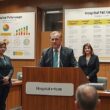RWE CEO Markus Krebber rejects the CDU’s demand to return to nuclear power. “The time for the three power plants that accounted for six percent of German power production is over” he said to the Rheinische Post (Tuesday edition).
“The RWE nuclear power plant in Emsland has been shut down and is being dismantled since April 15, 2023. Currently, there are 480 employees working on the dismantling process. If we wanted to reactivate the three reactors, it would require lengthy approval procedures, massive investments in retrofitting, and the buildup of a qualified workforce.”
The CDU wants to review the reactivation of the three last shut-down reactors (Emsland, Isar, and Neckarwestheim) and the construction of new facilities if it takes office. Krebber also considers the construction of new facilities to be hopeless: “A new construction takes up to ten years or more, and nuclear power does not help with the current shortages. Current nuclear projects in other countries show that they are often twice as expensive as planned and cost billions of dollars. Whether new technologies like small modular reactors (SMRs) will ever be profitable is open.”
The RWE CEO continues, “Therefore, the state would have to take on the economic risk if it wants new facilities to be built.” Krebber sees no problem in Germany importing French nuclear power: “It is true that Germany has repeatedly imported French nuclear power. Most recently, it was two gigawatts. However, this is normal in Europe. In the energy crisis, Germany has supported France with exports.”
Krebber is skeptical about the end of coal power by 2030. “RWE is working on the coal exit by 2030, which we have agreed on with the federal and state governments. This only works if we get the tender for gas power plants by 2025” said the company’s CEO to the Rheinische Post. Otherwise, the brown coal power plants and open-pit mines would have to run longer.
“By 2026, the government will review the exit date as provided for by law. It will then be a political decision whether our power plants are allowed to run for three more years in reserve after 2030.”
The manager warned, “The new federal government must immediately put the power plant strategy on the right track, so we can start building hydrogen-capable gas power plants. We want to build at least three gigawatts in North Rhine-Westphalia alone.”
The RWE CEO criticized Federal Economic Minister Robert Habeck (Greens), who only plans to tender 12.5 gigawatts of new gas power plants and set gas mix targets: “The federal government should tender 15 to 20 gigawatts of new power plants, so we have enough backup capacities in the future” said Krebber. “The government should not prescribe the fuel mix, but leave it to the market. The emissions trading system is the central instrument for climate protection and is sufficient for decarbonization.”
The entrepreneur demanded rapid social reforms from the new federal government: “We need more dynamics in the labor market. A four-day week over only 30 years of working life will not be enough to maintain the standard of living of today. The retirement age must be oriented towards the demographic change. And it is important that work becomes more rewarding again. This could also involve reviewing the basic income.





